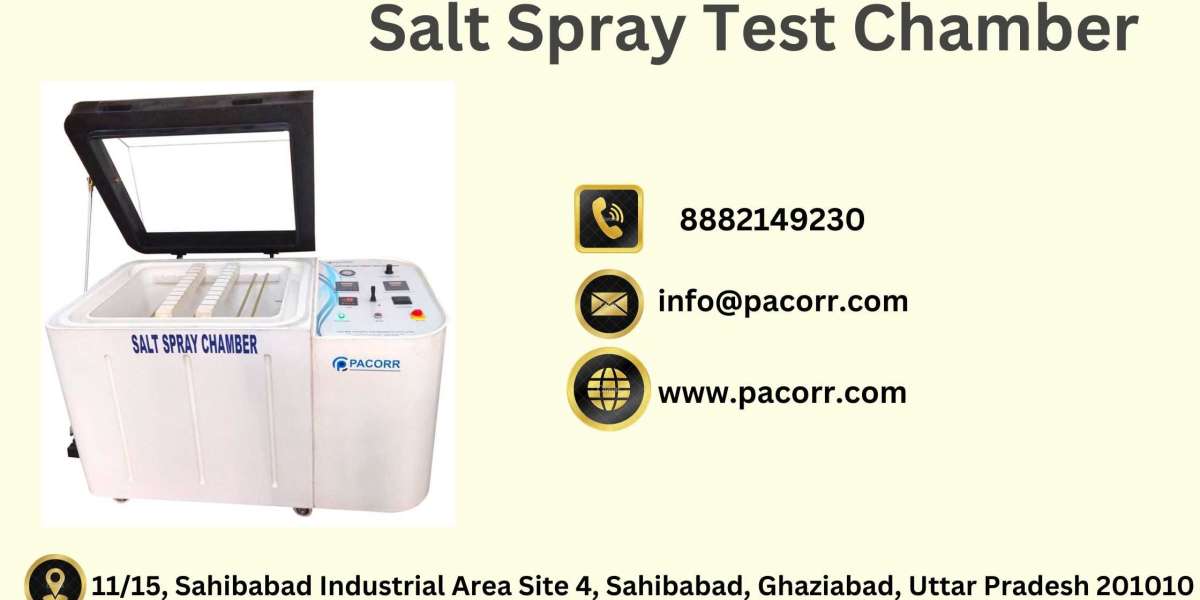Introduction
In the world of manufacturing and product development, ensuring the durability and longevity of materials is paramount. One of the key tests for this purpose is the salt spray test, performed using a Salt Spray Chamber. This article delves into the importance, working principles, applications, and benefits of Salt Spray Chambers, highlighting their critical role in various industries.
Understanding Salt Spray Chambers
A Salt Spray Test Chamber, also known as a salt fog chamber, is a controlled environment designed to simulate and accelerate the effects of corrosive conditions. It exposes materials and products to a salt-laden mist, replicating the harsh conditions they might face in real-world environments. This accelerated testing method helps manufacturers identify potential weaknesses and improve product quality.
How Salt Spray Chambers Work
The Salt Spray Chamber Price operates on a straightforward yet effective principle. It involves creating a highly corrosive atmosphere within the chamber by atomizing a salt solution, typically sodium chloride, into a fine mist. This mist settles on the test samples, promoting corrosion. The chamber maintains specific temperature and humidity levels to ensure consistent and repeatable results.
Key Components of a Salt Spray Chamber
- Test Chamber: The enclosed space where test samples are placed. It is designed to resist corrosion and ensure even distribution of the salt spray.
- Atomizing Nozzle: This component converts the salt solution into a fine mist, ensuring uniform coverage of the samples.
- Heating System: Maintains the desired temperature inside the chamber, which is crucial for the accuracy and consistency of the test.
- Control Panel: Allows users to set and monitor test parameters, such as temperature, humidity, and test duration.
Applications of Salt Spray Chambers
Salt Spray Chambers are widely used across various industries, including:
- Automotive Industry: Testing the corrosion resistance of car parts, including body panels, chassis components, and fasteners.
- Aerospace Industry: Ensuring the durability of aircraft components, such as fuselage parts and landing gear, which are exposed to harsh environmental conditions.
- Marine Industry: Evaluating the corrosion resistance of materials used in ships, boats, and offshore structures.
- Electronics Industry: Testing the corrosion resistance of electronic components, connectors, and enclosures to ensure their reliability in adverse conditions.
- Construction Industry: Assessing the durability of building materials, including metals, coatings, and fasteners, which are exposed to outdoor environments.
Benefits of Using Salt Spray Chambers
- Accelerated Testing: Salt Spray Test Chambers provide a rapid assessment of a material's corrosion resistance, enabling manufacturers to identify potential issues and make improvements quickly.
- Consistency and Repeatability: The controlled environment of the chamber ensures consistent and repeatable test results, which are essential for quality control and product development.
- Cost-Effective: By identifying potential corrosion issues early in the development process, manufacturers can avoid costly recalls and product failures.
- Compliance with Standards: Salt Spray Chambers help manufacturers comply with industry standards and regulations, such as ASTM B117, ISO 9227, and JIS Z 2371, which specify the requirements for salt spray testing.
Choosing the Right Salt Spray Chamber
When selecting a Salt Spray Chamber, it is crucial to consider the following factors:
- Chamber Size: Ensure the chamber can accommodate the size and number of test samples required for your specific application.
- Control and Monitoring: Look for a chamber with advanced control and monitoring features to ensure precise test conditions and accurate results.
- Durability and Maintenance: Choose a chamber made from corrosion-resistant materials to ensure longevity and ease of maintenance.
- Compliance: Ensure the chamber complies with relevant industry standards and certifications.
Conclusion
Salt Spray Chambers Price are indispensable tools for industries that require rigorous corrosion resistance testing. By simulating real-world corrosive conditions, these chambers help manufacturers enhance product quality, ensure compliance with standards, and ultimately deliver durable and reliable products to the market. Investing in a high-quality Salt Spray Chamber is a crucial step towards achieving excellence in material performance and product longevity.
Frequently Asked Questions (FAQ)
Q1: What is a Salt Spray Chamber used for? A Salt Spray Chamber is used to simulate and accelerate the effects of corrosive conditions on materials and products, helping manufacturers assess their corrosion resistance.
Q2: How does a Salt Spray Chamber work? It creates a corrosive atmosphere by atomizing a salt solution into a fine mist within a controlled environment. This mist settles on test samples, promoting corrosion.
Q3: What industries use Salt Spray Chambers? Industries such as automotive, aerospace, marine, electronics, and construction use Salt Spray Test Chambers to test the corrosion resistance of their materials and products.
Q4: What are the benefits of using a Salt Spray Chamber? Benefits include accelerated testing, consistent and repeatable results, cost-effectiveness, and compliance with industry standards.
Q5: How do I choose the right Salt Spray Chamber? Consider factors such as chamber size, control and monitoring features, durability, maintenance, and compliance with relevant industry standards.
Q6: What standards apply to Salt Spray Testing? Common standards include ASTM B117, ISO 9227, and JIS Z 2371, which specify the requirements for salt spray testing.






